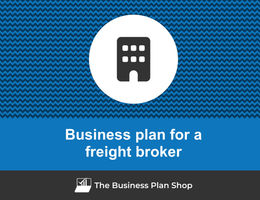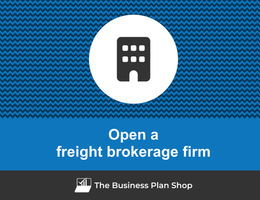How to create a financial forecast for a freight brokerage firm?
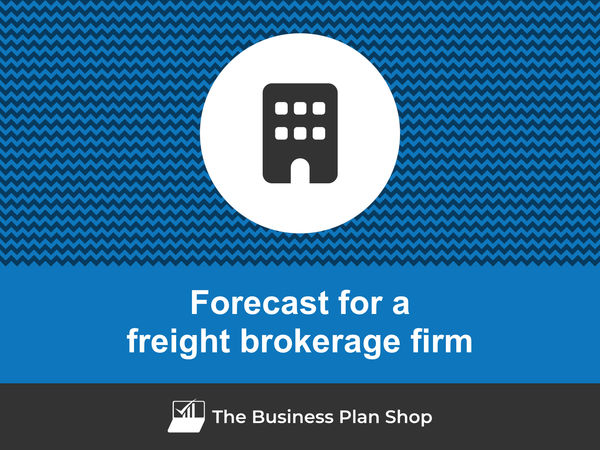
If you are serious about keeping visibility on your future cash flows, then you need to build and maintain a financial forecast for your freight brokerage firm.
Putting together a freight brokerage firm financial forecast may sound complex, but don’t worry, with the right tool, it’s easier than it looks, and The Business Plan Shop is here to guide you.
In this practical guide, we'll cover everything you need to know about building financial projections for your freight brokerage firm.
We will start by looking at why they are key, what information is needed, what a forecast looks like once completed, and what solutions you can use to create yours.
Let's dive in!
Why create and maintain a financial forecast for a freight brokerage firm?
Creating and maintaining an up-to-date financial forecast is the only way to steer the development of your freight brokerage firm and ensure that it can be financially viable in the years to come.
A financial plan for a freight brokerage firm enables you to look at your business in detail - from income to operating costs and investments - to evaluate its expected profitability and future cash flows.
This gives you the visibility needed to plan future investments and expansion with confidence.
And, when your trading environment gets tougher, having an up to date freight brokerage firm forecast enables you to detect potential upcoming financing shortfalls in advance, enabling you to make adjustments or secure financing before you run out of cash.
It’s also important to remember that your freight brokerage firm's financial forecast will be essential when looking for financing. You can be 100% certain that banks and investors will ask to see your numbers, so make sure they’re set out accurately and attractively.
Need a convincing business plan?
The Business Plan Shop makes it easy to create a financial forecast to assess the potential profitability of your projects, and write a business plan that’ll wow investors.

What information is needed to build a freight brokerage firm financial forecast?
The quality of your inputs is key when it comes to financial modelling: no matter how good the model is, if your inputs are off, so will the forecast.
If you are building a financial plan to start a freight brokerage firm, you will need to have done your market research and have a clear picture of your sales and marketing strategies so that you can project revenues with confidence.
You will also need to have a clear idea of what resources will be required to operate the freight brokerage firm on a daily basis, and to have done your research with regard to the equipment needed to launch your venture (see further down this guide).
If you are creating a financial forecast of an existing freight brokerage firm, things are usually simpler as you will be able to use your historical accounting data as a budgeting base, and complement that with your team’s view on what lies ahead for the years to come.
Let's now zoom in on what will go in your freight brokerage firm's financial forecast.
The sales forecast for a freight brokerage firm
The sales forecast, also called topline projection, is normally where you will start when building your freight brokerage firm financial forecast.
Creating a coherent sales projection boils down to estimating two key drivers:
- The average price
- The number of monthly transactions
To do this, you will need to rely on historical data (for an existing business), market research data (for both new and existing freight brokerage firms), and consider the elements below:
- Fluctuations in fuel prices: As a freight brokerage firm, you rely heavily on trucking companies to transport goods. Any changes in fuel prices can affect the rates that trucking companies charge, which in turn can impact the prices you charge your clients.
- Industry regulations: Changes in regulations, such as new safety requirements or restrictions on certain types of cargo, can impact the availability and cost of carriers. This can affect your ability to secure shipments and may also result in higher prices for your clients.
- Inflation: Inflation can impact the cost of goods and services, including transportation costs. This can result in higher prices for your clients and may also affect the number of transactions as businesses may be more cautious with their spending.
- Competition: The freight brokerage industry is highly competitive, and changes in the competitive landscape can affect your average price and number of transactions. For example, if a new brokerage firm enters the market and offers lower prices, you may need to adjust your pricing strategy to remain competitive.
- Natural disasters: Natural disasters, such as hurricanes or snowstorms, can disrupt transportation routes and impact the availability of carriers. This can result in delays and increased costs for shipments, which may affect your average price and number of transactions.
After the sales forecast comes the operating expenses budget, which we will now look into in more detail.
Need a convincing business plan?
The Business Plan Shop makes it easy to create a financial forecast to assess the potential profitability of your projects, and write a business plan that’ll wow investors.

The operating expenses for a freight brokerage firm
Once you know what level of sales you can expect, you can start budgeting the expenses required to operate your freight brokerage firm on a daily basis.
Expenses normally vary based on how much revenue you anticipate (which is why, from experience, it is always better to start your forecast with the topline projection), and where your business is based.
Operating expenses for a freight brokerage firm will include some of the following items:
- Staff Costs: This includes salaries, benefits, and training expenses for all employees, including brokers, dispatchers, and administrative staff.
- Accountancy Fees: As a freight brokerage firm, you will need to hire an accountant or use accounting software to manage your financial records and ensure compliance with tax laws.
- Insurance Costs: You will need to have insurance coverage for your business, including liability insurance, cargo insurance, and professional indemnity insurance.
- Software Licences: To streamline your operations and manage your load tracking, invoicing, and billing, you will need to invest in freight brokerage software and pay for annual licenses.
- Banking Fees: As a freight brokerage firm, you will need to open a business bank account and pay for transaction fees, wire transfer fees, and other banking services.
- Marketing and Advertising Expenses: To attract new clients and build your brand, you will need to invest in marketing and advertising efforts, such as website development, social media ads, and print materials.
- Office Rent and Utilities: You will need to rent office space to run your brokerage firm and pay for utilities, such as electricity, water, and internet, to keep your operations running smoothly.
- Office Supplies: This includes all necessary office supplies, such as stationery, printer ink, and postage, to keep your business running efficiently.
- Telephone and Internet Expenses: As a freight brokerage firm, you will need to have reliable telephone and internet services to communicate with clients, carriers, and other parties involved in the transportation process.
- Legal Fees: You may need to seek legal advice or hire a lawyer to review contracts, handle disputes, and ensure compliance with regulations.
- Training and Development Expenses: To stay up-to-date with industry trends and regulations, you may need to invest in training and development programs for your employees.
- Professional Memberships and Subscriptions: You may need to pay for memberships and subscriptions to industry associations and publications to stay informed and network with other professionals in the freight brokerage industry.
- Vehicle and Transportation Expenses: If you own or lease vehicles for your brokerage firm, you will need to budget for fuel, maintenance, and insurance costs.
- Taxes and Licenses: As a business owner, you will need to pay taxes and obtain necessary licenses and permits to operate your freight brokerage firm.
- Office Cleaning and Maintenance: To maintain a professional and organized office space, you will need to budget for cleaning and maintenance services.
This list will need to be tailored to the specificities of your freight brokerage firm, but should offer a good starting point for your budget.
What investments are needed to start or grow a freight brokerage firm?
Once you have an idea of how much sales you could achieve and what it will cost to run your freight brokerage firm, it is time to look into the equipment required to launch or expand the activity.
For a freight brokerage firm, capital expenditures and initial working capital items could include:
- Transportation Software: As a freight brokerage firm, you will need to invest in transportation software to manage your operations efficiently. This includes software for load tracking, carrier management, and customer relationship management.
- Office Equipment: You will need to purchase office equipment such as computers, printers, scanners, and furniture to set up your office and run your day-to-day operations.
- Freight Broker Bond: In order to legally operate as a freight brokerage firm, you will need to obtain a surety bond. This will act as a guarantee to shippers and carriers that you will fulfill your financial obligations.
- Freight Broker License: You will also need to obtain a freight broker license from the Federal Motor Carrier Safety Administration (FMCSA) in order to legally operate as a freight brokerage firm.
- Communication Equipment: As a freight brokerage firm, you will need to communicate with shippers, carriers, and your team on a regular basis. This may include investing in communication equipment such as phones, internet services, and other communication tools.
Again, this list will need to be adjusted according to the specificities of your freight brokerage firm.
Need a convincing business plan?
The Business Plan Shop makes it easy to create a financial forecast to assess the potential profitability of your projects, and write a business plan that’ll wow investors.

The financing plan of your freight brokerage firm
The next step in the creation of your financial forecast for your freight brokerage firm is to think about how you might finance your business.
You will have to assess how much capital will come from shareholders (equity) and how much can be secured through banks.
Bank loans will have to be modelled so that you can separate the interest expenses from the repayments of principal, and include all this data in your forecast.
Issuing share capital and obtaining a bank loan are two of the most common ways that entrepreneurs finance their businesses.
What tables compose the financial plan for a freight brokerage firm?
Now let's have a look at the main output tables of your freight brokerage firm's financial forecast.
The profit & loss forecast
The forecasted profit & loss statement will enable you to visualise your freight brokerage firm's expected growth and profitability over the next three to five years.
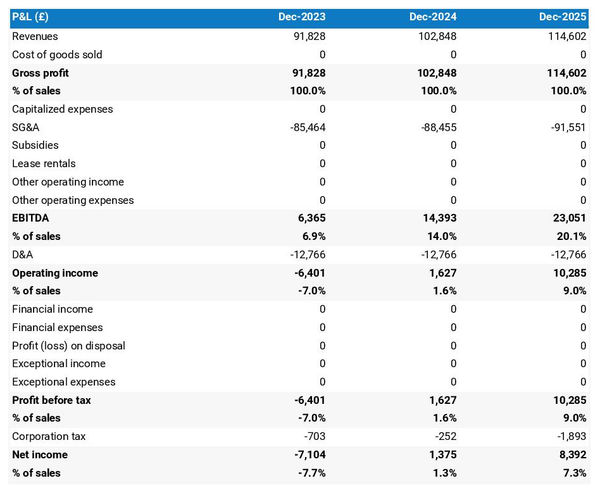
A financially viable P&L statement for a freight brokerage firm should normally show:
- Sales growing above inflation
- Stable or expanding (ideally) profit margins
- A net profit
This will of course depend on the stage of your business: a new venture might be loss-making until it reaches its breakeven point in year 2 or 3, for example.
The projected balance sheet
The projected balance sheet gives an overview of your freight brokerage firm's financial structure at the end of the financial year.
It is composed of three categories of items: assets, liabilities and equity:
- Assets: are what the business possesses and uses to produce cash flows. It includes resources such as cash, buildings, equipment, and accounts receivable (money owed by clients).
- Liabilities: are the debts of your freight brokerage firm. They include accounts payable (money owed to suppliers), taxes due and bank loans.
- Equity: is the combination of what has been invested by the business owners and the cumulative profits to date (which are called retained earnings). Equity is a proxy for the value of the owner's stake in the business.
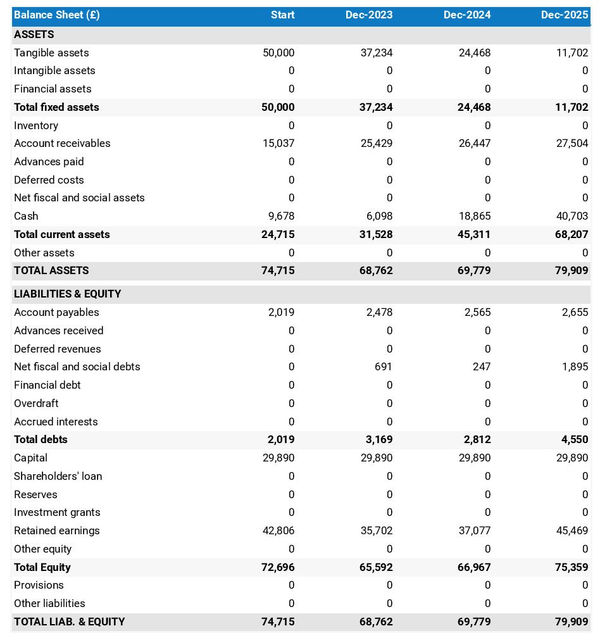
The cash flow projection
The cash flow forecast of your freight brokerage firm will show how much cash the business is expected to generate or consume over the next three to five years.
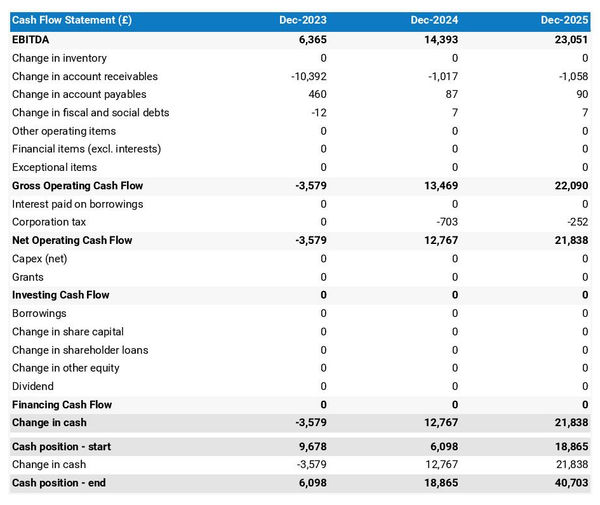
There are multiple ways of presenting a cash flow forecast but from experience, it is better to organise it by nature in order to clearly show these elements:
- Operating cash flow: how much cash is generated by the freight brokerage firm's operations
- Investing cash flow: what is the business investing to expand or maintain its equipment
- Financing cash flow: is the business raising additional funds or repaying financiers (debt repayment, dividends)
Your cash flow forecast is the most important element of your overall financial projection and that’s where you should focus your attention to ensure that your freight brokerage firm is adequately funded.
Note: if you are preparing a financial forecast in order to try to secure funding, you will need to include both a yearly and monthly cash flow forecast in your freight brokerage firm's financial plan.
Need a convincing business plan?
The Business Plan Shop makes it easy to create a financial forecast to assess the potential profitability of your projects, and write a business plan that’ll wow investors.

Which tool should you use to create your freight brokerage firm's financial forecast?
Creating your freight brokerage firm's financial forecast may sound fairly daunting, but the good news is that there are several ways to go about it.
Using online financial forecasting software to build your freight brokerage firm's projections
The modern and easiest way is to use an online financial forecasting tool such as the one we offer at The Business Plan Shop.
There are several advantages to using specialised software:
- You can easily create your financial forecast by letting the software take care of the financial calculations for you without errors
- You have access to complete financial forecast templates
- You get a complete financial forecast ready to be sent to your bank or investors
- You can easily track your actual financial performance against your financial forecast, and recalibrate your forecast as the year goes by
- You can create scenarios to stress test your forecast's main assumptions
- You can easily update your forecast as time goes by to maintain visibility on future cash flows
- You have a friendly support team on standby to assist you when you are stuck
- It’s cost-efficient and much cheaper than using an accountant or consultant (see below)
If you are interested in this type of solution, you can try our projection software for free by signing up here.
Calling in a financial consultant or chartered accountant
Enlisting the help of a consultant or accountant is also a good way to obtain a professional freight brokerage firm financial forecast.
The downside of this solution is its cost. From experience, obtaining a simple financial forecast over three years (including a balance sheet, income statement, and cash flow statement) is likely to cost a minimum of £700 or $1,000.
The indicative cost above, is for a small business, and a forecast is done as a one-shot exercise. Using a consultant or accountant to track your actuals vs. forecast and to keep your financial projections up to date on a monthly or quarterly basis will cost a lot more.
If you opt for this solution, make sure your accountant has in-depth knowledge of your industry, so that they may challenge your figures and offer insights (as opposed to just taking your assumptions at face value to create the forecast).
Why not use a spreadsheet such as Excel or Google Sheets to build your freight brokerage firm's financial forecast?
Creating an accurate and error-free freight brokerage firm financial forecast on Excel (or any spreadsheet) is very technical and requires both a strong grasp of accounting principles and solid skills in financial modelling.
Most entrepreneurs lack the expertise required to create an accurate financial forecast using spreadsheet software like Excel or Google Sheets. As a result, it is unlikely anyone will trust your numbers.
The second reason is that it is inefficient. Building forecasts on spreadsheets was the only option in the 1990s and early 2000s, nowadays technology has advanced and software can do it much faster and much more accurately.
This is why professional forecasters all use software. With the rise of AI, software is also becoming smarter at helping us detect mistakes in our forecasts and helping us analyse the numbers to make better decisions.
Finally, like everything with spreadsheets, tracking actuals vs. forecasts and updating your forecast as the year progresses is manual, tedious, error-prone, and time-consuming. Whereas financial forecasting software like The Business Plan Shop is built for this.
Need a convincing business plan?
The Business Plan Shop makes it easy to create a financial forecast to assess the potential profitability of your projects, and write a business plan that’ll wow investors.

Use our financial projection templates for inspiration
The Business Plan Shop has dozens of financial forecast templates available.
Our examples contain a complete business plan with a financial forecast and a written presentation of the company, the team, the strategy, and the medium-term objectives.
Whether you are just starting out or already have your own freight brokerage firm, looking at our financial forecast template is a good way to:
- Understand what a complete business plan should look like
- Understand how you should model financial items for your freight brokerage firm
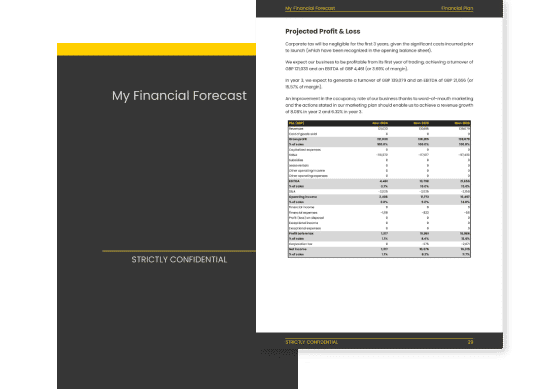
Takeaways
- Having a financial forecast enables you to visualise the expected growth, profitability, and cash generation for your business over the next three to five years.
- Tracking actuals vs. forecast and keeping your financial projections up-to-date is the only way to get a view on what your freight brokerage firm future cash flows may look like.
- Using financial forecasting software is the mordern and easy way to create and maintain your forecasts.
This is the end of our guide on how to build the financial forecast for a freight brokerage firm, we hope you found it useful. Don't hesitate to contact us if you want to share your feedback or have any questions.
Need a convincing business plan?
The Business Plan Shop makes it easy to create a financial forecast to assess the potential profitability of your projects, and write a business plan that’ll wow investors.

Also on The Business Plan Shop
- Example of financial forecast
- How to project sales for a business?
- Sample financial forecast for business idea
Know someone who owns or is thinking of starting a freight brokerage firm? Share our forecasting guide with them!


